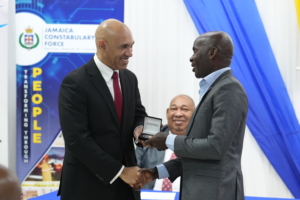



The effective counter-gang strategies employed by the Counter Terrorism & Organised Crime Investigations Branch (CTOC) and Proactive Investigations Unit (PIU) were recognised and awarded for their consistent decline in gang-related murders during the PIU Conference held at the Police Officers Club in Kingston on Tuesday, March 12.
Commissioner of Police Major General Antony Anderson, who has been at the helm of driving the Force’s Transformation, congratulated the members for their impact on gang-related murders.
“Gangs have been a challenge for many years… and I believe that the work that has been done by the Anti-gang Unit at headquarters and PIU has had an impact on the gangs out there,” states Commissioner Anderson.
He further stated they should also be really proud of their increase in speed and the quality of investigations. Continuing to recognise their dedication, Commissioner Anderson presented three dutiful detectives with the ‘Commissioner’s Award for Excellence’.
The recipients are Detective Constable Christopher Richardo Bryan, with eighteen (18) years of service, who played a crucial role in disrupting the notorious “Clansman Gang”, Detective Woman Sergeant Melonie Williams, who in her fourteen (14) years of service has notably secured numerous convictions under various acts and Detective Inspector Patrick Walker, with over 32 years of service, who served as the lead investigator in the Clansman gang case and provided pivotal support in the Uchence case.
Head of the Crime Portfolio, Deputy Commissioner of Police (DCP), Fitz Bailey also extended his gratitude for the investigators’ effort in making Jamaica a better place.
“Thank you very much for the work, effort and being there for Jamaica. I know you have made a lot of sacrifices and even in the midst of difficult moments you have done what you have done without recognition. So as your commander and Deputy Commissioner, I do appreciate your work,” exclaimed DCP Bailey.
The Jamaica Constabulary Force (JCF) continues to make gains in denying gangs freedom of movement, disarming criminal gangs to reduce their violence-producing capacity; deterring and dissuading persons from engaging in criminal gang activities and defending the communities and the vulnerable from gang violence.







